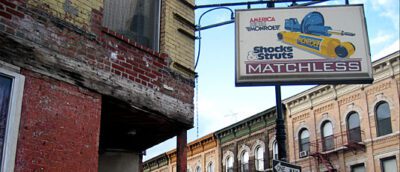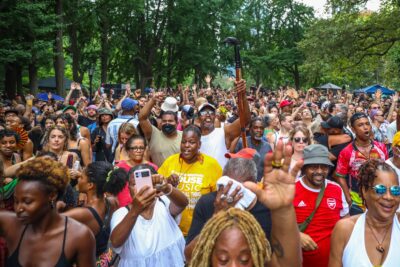I Saw Sparks: Brooklyn From Both Sides
Sometimes on nice days I skip my transfer to the G train. I walk from the 7 train stop at Vernon Jackson over the Pulaski Bridge and do the same on the way home. One night, instead of the usual throngs of bikers, runners and commuters traipsing over the bridge, I found everyone standing still, watching fireworks light up the sky over the city and murmuring to each other about what the occasion might be. It was summer and that was usually reason enough, so I too stopped to watch too, remembering how occasionally as a kid I wanted to sit and dangle my feet off the roof of our standard split-level Jersey house when it was the Fourth of July, to try and catch the fireworks going off over the Hudson. My dad would almost give in–until my mom would yell about broken skulls and neighbors, tsking him–and I’d have to watch them on TV instead, thinking I of my grandparents watching the same fireworks, a seemingly distant thirty miles away in Brooklyn.
***
304 Avenue I at the corner of East 3rd. My grandparents lived in an ordinary (yet majestic to me) brownstone with a long curving walk-up staircase, a staircase that would eventually be the reason they had to move, but as a child, I’d excitedly sprint up it to bang on the door of their railroad apartment and announce my arrival. I grew up hearing of my father and uncle’s exciting summers as children in Brooklyn, where they’d be carted off to Coney Island for fireworks and Nathan’s hot dogs. But in my childhood, everything across the river always seemed so beyond my reach.
I memorized my grandparent’s address like it was the cipher to a foreign country. Brooklyn felt that way at five years old, when my family would take off from quiet, suburban New Jersey for the wild untamed streets of Brooklyn. I’d settle down in the backseat and resign myself to what felt like hours of watching trees, bridges and then very tall buildings fly by, while my father complained about the traffic and the tolls and my mom yelled that he never remembered the right turnoff from Ocean Parkway. So glad we left, they would both recite again and again as we sat stock-still on the highway, horns honking, people swearing out their windows. Nothing has changed, I remember hearing my mom say. I’d watch my parents trade glances and shake their heads at these incidents.
But then we’d pass some street where my mom would excitedly grab my dad’s arm. “Remember the Chinese food place? Remember those noodles? The best!” Or he’d absently ask her out of nowhere: “Oh Dee do you think Lundy’s is still open?” Then she’d turn around and regale us with stories about how my father would take her to the most delicious raw bar in Sheepshead Bay as soon as light-jacket-weather reappeared each year, or smile wistfully recounting how they whiled away summer days back in Brooklyn. Then we’d hit a pothole and my father would curse–and quickly apologize for it–and my mother would slip back into her previous tirade of everything terrible about Brooklyn. This split instilled in me a confusion about the place that had been the foundation for their lives. Why did you leave? I would ask as I got older. It was just time to leave, they would shrug, with the unspoken implication that leaving Brooklyn behind had been a form of trading up.
***
Years later when my grandmother passed, I drove in the funeral procession that made its way from her tiny house on the Jersey shore back through Brooklyn to the cemetery where my grandfather had been laid to rest two decades earlier. Now in my mid-twenties, I had long since realized that the small town in New Jersey where I grew up had never really felt like home. Scanned the crowded rows of houses as we drove to a graveyard so large, one side was actually in Queens, I noted the kids walking down the stairs into the subway and hanging out on street corners. Their backyards were bodegas, where the most beautiful bouquets of flowers I’d ever seen sold for a mere $9.99–the price proclaimed by black sharpie on cardboard. Gerber daisies was spelled wrong, but for that price who cares? The scene felt like something out of a movie; there was an easiness about New Yorkers I’d noticed and envied my whole life, aware of it most deeply in my cousins who had never left the city. It was a relaxed sense of belonging, of knowing who you were, and it emanated from everyone.
I burst into tears for what felt like the thousandth time in the last three days as we passed the home my family grew up in. 304 Avenue I at the corner of East 3rd. The neighborhood where they grew up and learned to love and live and argue. It felt real, and warm, with girls drawing in chalk on a sidewalk and kids skateboarding in and out of traffic. Watching them caused my mother to mutter under her breath in the passenger seat, but I wondered if I could have belonged here, too. What if my parents hadn’t left for suburban pastures? What would my life have been like here? My mind broke off into a Sliding Doors world where alongside the insecure awkward kid in New Jersey, there was also a streetwise confident one who knew which train line got you to Coney Island the fastest.
I wish you hadn’t left, I silently thought to myself as the priest read my grandmother’s last rites, avoiding eye contact with the Manhattanite cousin who arrived solo in her own limousine, reminding everyone else of her success. I romanticized her life as my fantasy for a moment, Like April Wheeler did with Paris in Revolutionary Road, as though geography was the key to happiness, and life could begin as soon as I went somewhere else. Perhaps it does in a way–but it’s a new life, not a replacement–or even better–than the one you already had.
***
While my grandmother was dying, she told me I needed to do whatever it was I wanted to do, and never stop trying no matter what, to be happy and work hard. The last time I hugged her frail body in the hospital she whispered to me, You can do anything. I am so proud of you. There is a sense of the poetic that the job and new life I would find and fall in love with after she died would be in the borough where she spent the majority of her life. I imagine she posthumously handed me the keys to her castle, Brooklyn, where she raised her two sons, loved my grandfather, and laughed with her sister who lived upstairs.
For me, Brooklyn became the place where I discovered my desire to learn screenwriting, where I wrote my first play, where I finished my first book and planned a second one. But most of all, it became the place that felt more like home than anywhere else I had lived. It was the place where I felt like I could be finally myself–weird and creative and moody and alive. Moving here was a spark that launched me into what feels like the best, brightest burning part of my life.
Nowadays, when I have dinner with my parents we’ll shit-talk Brooklyn together. I’ll complain about the train schedule’s radical, teenaged mood swings, people who stop dead in the middle of the sidewalk, traffic. They’ll reiterate that nothing has ever changed. I’ll bring them pastries from a bakery I’ve found, and they’ll exclaim that Brooklyn has always had the best food in the world. I’ll shout that an idiot cab driver almost hit me when it was my right of way to cross the street–they’ll nod and nod.
In moments like the one on the Pulaski bridge, watching fireworks a few steps from the “Welcome to Brooklyn” sign, I understand that this city that will simultaneously drive you crazy and reveal its resplendent heart. It’s in moments like these that I realize all the years of my perceived disdain for the way my parents discussed the place they grew up was really their reluctant affection. Brooklyn is a place that’s ingrained in all of us; for them by birth, for me by choice. And now we see the fireworks from both sides.
Illustration by Ashley Lukashevsky.
You might also like 




















